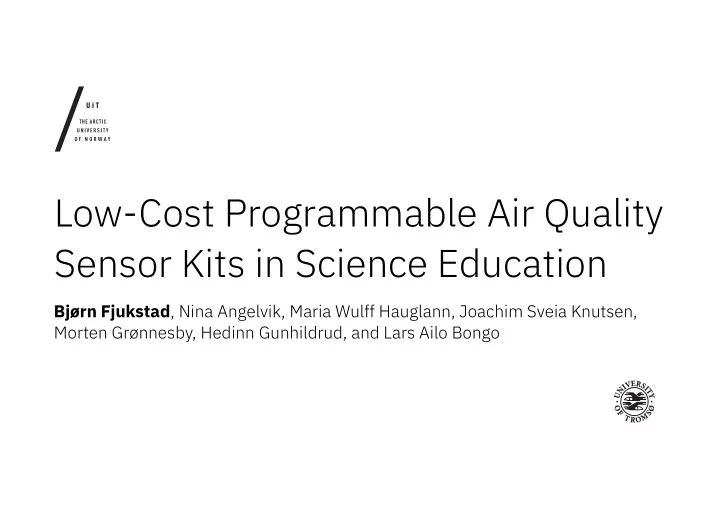

Low-Cost Programmable Air Quality Sensor Kits in Science Education Bjørn Fjukstad , Nina Angelvik, Maria Wulff Hauglann, Joachim Sveia Knutsen, Morten Grønnesby, Hedinn Gunhildrud, and Lars Ailo Bongo
Luftforurensing , ø i . m NETTSIDE: Ann-Kristin Schleis sjekker nettsiden hvor måledataene
Who I am • PhD Student in Computer Science focusing on visualization and Arctic circle analysis of genomic data • Coordinated the local coding club for over 3 years • As a part of my position I teach coding classes to schools
Project Summary • Students build and code sensor kits to study air quality in their local environment • We provide an open platform to store and explore the collected data • Pilot study in a Norwegian upper secondary school, now in 10 schools across Northern Norway • Pedagogical resources with lectures and tutorials • Everything is open-sourced at airbit.uit.no
Motivation • Digital skills are poorly expressed in the different subjects throughout Norwegian education. • Norway falling behind due to lack of courses, lack of teacher courses, teaching material. • Norwegian students simply use technology, they don’t develop any new technology • In the upper secondary school they have a “Technology” subject with room for larger projects
Air Pollution • A global health issue that reduces quality of life in polluted areas and causes diseases. • The Norwegian government continuously monitor and create air pollution forecasts • In Northern Norway the air quality is rapidly changing during the winter months mainly due to cars with studded winter tyres and emissions from diesel powered cars
Our Course • Maker inspired citized science project where students study air-quality patterns in their r community I t ett- • Introduce computer-science and - g t- engineering in Norwegian upper secondary l- r, schools å e • Teachers and students choose what to study and can tailor the course to fit the class
Course contents • The air:bit project spans a semester, but classes combine it with other projects • Two-day teacher workshop • Typical course structure • Introduction and inspiration • Kit assembly and configuration • Data Collection and analysis • Summarize findings in a report or presentation
air:bit • Arduino microcontroller • Sensors: Dust, temperature, humidity, GPS • Storage: Memory card
air:bit details Component Cost (USD) Arduino Uno microcontroller $3.14 NEO6MV2 GPS module $8.19 Sharp GP2Y1010AUOF optical dust sensor $5.99 DHT11 temperature and humidity sensor $1.00 SD Card reader and 16GB memory card $4.74 Portable power bank $15.00 Two indicator leds and resistors $1.00 Custom PCB circuit board $2.00 Total: $41.06
Coding • We provide example code and tutorials for each component • Students assemble a fully working solution themselves
Online Resources • Website for students and educators • Tutorials on how to assemble the kit as well as coding examples • Upload and explore collected air quality data • Online at airbit.uit.no
Air Pollution Data Analysis Platform Air quality sensor kit • Built by a master student, Nina Angelvik, presented as a poster here at ACM SIGCSE Amazon EC2 2018 airbit.uit.no • We store all data in a SQL database on App Engine Google Cloud Platform Files Cloud Rails web server Storage Data Workers Cloud Cloud SQL Pub/Sub Cloud computing, data analysis
Note on Privacy • Students are given information on how the data is used and stored • We have consent from the participating students to share the data
Air Pollution Engagement Projects • Friskby Bergen (friskby.no) a Norwegian project similar to ours where they use a Raspberry Pi connected by WiFi • hackAIR (hackair.eu) is a European project to engage citizens in air pollution • Luftdaten (luftdaten.info) is a project from Germany where they host workshops and events
Experiences and lessons learned • Given once in 2017 in a class of 26 students in groups of 3-4. • Assembly and soldering without any major issues • Coding was by far the most challenging part of the course
Future directions
New design PM2.5 / PM10 -40 - 80°C ± 0.5°C 0 - 50°C ±2°C
11 schools this spring
Community • Created an online community for participating teachers • Q&A • Sharing experiences and helping other teachers
Reusing the air:bit • Reuse the completed kit in lower grades • One class will reuse the kit for a “hiking trail mapping assignment” where they will map different hiking trails using the air:bit
Data Science?
fjukstad.github.io / airbit.uit.no Low-Cost Programmable Air Quality Sensor Kits in Science Education Bjørn Fjukstad , Nina Angelvik, Maria Wulff Hauglann, Joachim Sveia Knutsen, Morten Grønnesby, Hedinn Gunhildrud, and Lars Ailo Bongo
Recommend
More recommend